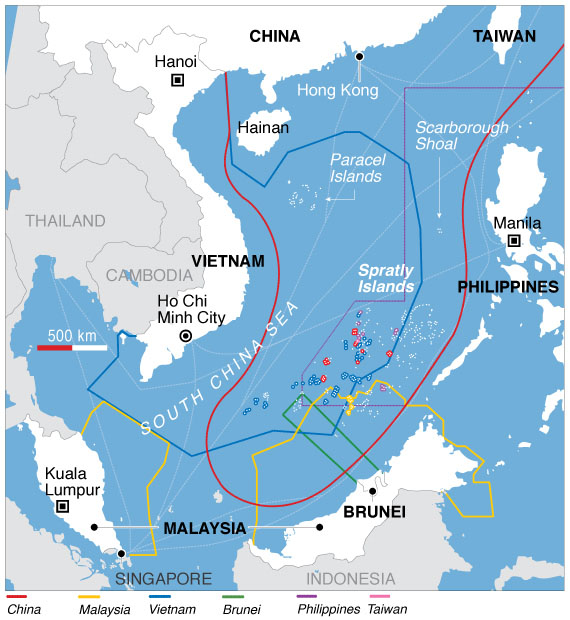China scored a diplomatic “slam dunk” on the South China Sea issue when Southeast Asian nations issued a diluted statement on the dispute and agreed to Beijing’s terms on talks.
After two days of meetings in Manila, foreign ministers from the 10-member Association of Southeast Asian Nations (Asean) issued a joint communiqué that analysts say was “carefully worded to avoid angering China”.
The release of the statement came shortly after ministers met Chinese Foreign Minister Wang Yi and agreed on a framework for conducting negotiations on the dispute.
“This is an important outcome of our joint effort,” Mr Wang told reporters as he lauded the agreement.

China claims nearly all of the strategically vital and resource-rich waters, despite overlapping claims by the Philippines, Vietnam, Malaysia, Brunei and Taiwan.
Beijing has dramatically expanded its presence in recent years by building artificial islands and suspected military facilities.
In what is widely seen as a victory for Beijing yesterday (Sunday, August 6) Asean members declined to say in their joint statement that the code of conduct with China would be “legally binding”.
Vietnam, which has long pursued the most determined defence of its territorial claims, had argued that any agreement would be meaningless unless it were legally binding.
Critics of China have accused it of trying to divide Asean with strong-armed tactics and ‘chequebook diplomacy’, enticing smaller countries such as Cambodia and Laos to support it.
The Philippines, under President Benigno Aquino, was one of the most vocal critics of China and filed a case before a UN-backed arbitration, which last year ruled that China’s claims to the sea had no legal basis. China ignored the ruling.
Since then, President Duterte has played down the verdict in favour of pursuing warmer ties with Beijing.
The agreed framework for talks comes 15 years after a similar document — more strongly worded against China — was signed committing the parties to begin negotiations.
However, China has used those 15 years to cement its claims, while pushing Asean to issue ever-weaker statements of opposition.
Ei Sun Oh, adjunct senior fellow at the S. Rajaratnam School of International Studies in Singapore said: “It would appear China has never lost in terms of seeing the language of ASEAN forum statements being toned down.”
Philippine academic and security analyst Richard Heydarian summarised the latest developments in stronger terms “Overall it’s a slam dunk diplomatic victory for China,” he said.
A firmer line was taken by the USA, Australia and Japan today, when they denounced Beijing’s island-building and militarisation activities.
In a joint statement after their foreign ministers met on the sidelines of the gathering, the three countries criticised ongoing “land reclamation, construction of outposts, militarisation of disputed features” and said any code of conduct must be “legally binding, meaningful and effective.”
The three nations also called on China and the Philippines to respect last year’s arbitration ruling.
Prior to the release of the joint statement, China’s Foreign Minister Wang Yi had warned any interference from “outside parties” could jeopardise negotiations over the code of conduct.
